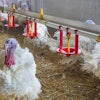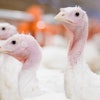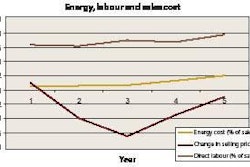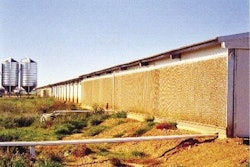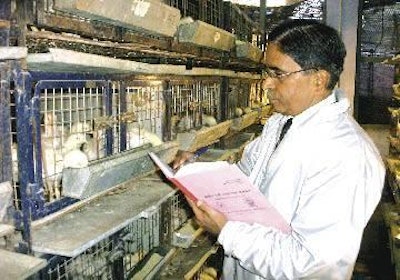
Of the USA, President Bush recently stated, "Agriculture ranks among the most crucial of our nation's industries yet its reliability and productivity are often taken for granted." This statement applies to most countries: Agriculture is practised over wide areas in an unprotected environment and subject to both natural and man-made mishaps. In addition, it is a sad fact that a tiny minority of the human population seems prepared to go to any lengths to publicise a particular cause and there is no doubt that the food supply chain in every country could be vulnerable to their activities.
In many developing countries, poultry production is carried out by both well established and professional poultry farmers as well as in backyard flocks. The whole poultry business is based on a network and activities and suppliers from the hatching of eggs, through brooding, growers/layers/broilers management and feed production through to the collection, storage and transportation of eggs, poultrymeat and culled birds. Although poultry production is widely practised in India, the industry has not yet fully established this network and so many of these activities are carried out in an independent and rather uncoordinated way.
This lack of cohesion tends to exaggerate unexpected events such as disease outbreaks, a sudden rise in feed prices and market slumps that destabilise the market. For example, thousands of birds were destroyed in the recent outbreaks of avian influenza, leaving poultry farmers with heavy financial losses.
To help minimise these effects, it is important that farmers have:
- modern knowledge and research outputs
- disease-resistant stock
- standardised and legally protected biosecurity measures
- safe feed ingredients
- access to fast disease diagnostic facilities and veterinary support
- established marketing systems for both inputs and products
- insurance cover
Poultry informatics may be able to play a role in mitigating future challenges, whilst also giving a boost to the Indian poultry industry. We have undertaken studies in this area on the industry, resources and research.
Poultry industry informatics
Poultry farms, hatcheries, feed-mills, equipment manufacturers, product traders and exporters spread throughout the country were divided into four major zones: North, South, East and West. Based on addresses from printed literature, we approached 2237 poultry industry units to send information on specially prepared forms. Questions included the year of their establishment, type of business, product specialities, expectations from research, technical needs, suggestions etc.
Complete questionnaires were received from 128 poultry industry units, revealing a need for closer co-operation between the industry and the scientific community. Common themes were a need for more disease-resistant strains capable of thriving in the different climatic environments of this country and improved disease diagnostics.
The Central Avian Research Institute (CARI), a leading institution on poultry research in India, offers standardised information for layer and broiler chickens, native fowls, quails, turkey and guinea fowl. Software for feed formulation is also available from the Institute. To help poultry farmers in remote locations, preliminary work on a disease-monitoring system was initiated on the basis of the details collected on poultry medications from 28 veterinary pharmaceutical manufacturers. We have patented five schemes to help self-employed farmers produce suitable poultry products with minimum financial investment and only basic skills and resources.
Poultry resource informatics
An inventory of required resources was seen as a requirement especially where the industry was most fragmented in order to raise production levels as well as to avert the chances of agro-terrorism. These resources include genetic material, feed ingredients, marketing networks, formal knowledge and training locally available.
With these objectives in mind, a questionnaire form was developed and sent to the directors of animal husbandry and veterinary services in each state. Based on the replies covering years 2001/02, 2002/03 and 2003-04, it revealed, among other first-hand information, locally developed genetic lines in J&K, Karnataka, locally available poultry feed ingredients and the need for a standard curriculum for poultry education programmes. From this study, Punjab, Karnataka, West Bengal and Gujarat were identified as the leading states for future poultry production.
Poultry research informatics
Research support is vital for the poultry industry as it provides a strong base for development activities and entrepreneurship. Easy access to research findings helps to avoid duplication and streamline future projects. With this aim in mind, we at CARI have started to computerise the data from current and past research projects. Information will be retrievable by starting and finishing dates, total budget, salient results, publications, technology generated/patent etc. It is hoped that this will help research managers to make quick decisions.
Challenges
While collecting information, we often noticed that the responses from surveyed people were scanty. Without direct financial benefit to the respondents, it is important to establish an informatics system that is confidential and yet gives beneficial feedback to those who co-operate fully to convince the industry that their interests are being served. Poor productivity on individual farms can arise from lapses in management through incomplete knowledge, a lack of training or unintentionally. Sub-optimal management and deficiencies in legislation make the poultry industry more vulnerable to acts of agro-terrorism.
The way ahead
These studies provide evidence of the scope for formulating poultry informatics at a national level. This will help information exchange between the different branches of the industry as well as devising measures for curbing agro-terrorism. A strong knowledge base creates awareness of the pros and cons of practices in the absence of a national poultry training programme.
Dr M.S. Swaminathan, Chairman of the National Commission on Farmers, recently emphasised the value of land mapping and associated legislation to prevent the use of agricultural land for non-agricultural purposes.
Future efforts for averting agro-terrorism in poultry production could involve a series of measures.
Vulnerability assessments
The vulnerability of poultry farms to agro-terrorism need to be assessed. This could include the installation of closed-circuit television (CCTV) at all possible entry points and near the water supply, feed store and poultry houses. Another critical time for feed and other inputs is during transportation.
Biosecurity
Effective biosecurity measures are vital at the poultry farm, feed-mill and processing plant.
Diagnostic facilities
Quick and effective control of poultry diseases especially those of public health importance is aided by the establishment of a national network of disease investigation laboratories. These need to be able to deal with crises, including agro-terrorism, whilst also incorporating information on disease symptoms, drug composition, indications, pack sizes etc.
Risk communication network
Poultry informatics may include avenues for a fast communication network to alert all stages of production in case of a crisis. It is important that the reporting of a problem is handled with care and without blame or discrimination.
Industry-research interface
As already indicated in pilot studies in 2000, there is a need for a separate agency to organise meetings to encourage direct and open communication between researchers and the other branches of the industry.
Our studies indicate that a national informatics system would offer great benefits to the poultry industry in India and other developing countries in terms of improved efficiency and standards throughout the industry as well as to help avert agro-terrorism.
